The pursuit for age reversal in humans by scientist: Is this really necessary and worth the efforts?
Something got me seriously thinking after attending a very interesting public lecture delivered by an erudite professor in which he critically discussed regenerative medicine in a more practical approach. During the course of the lecture, a lot went through my mind. Decided to do some research and I bumped into a research paper that attempted age reversal. Though not a new thing, but the advances that have been made thus far is indeed highly revealing of the potentials that there is in cell manipulations, as you read along, you will understand better. But wait, why and how do humans age? I think if we are able to understand the real cause of aging, then understanding its reversal (if really possible and reasonable) becomes easier to understand.
Humans and aging process
Generally speaking, aging is an inevitable process that must occur in all living thing creatures no matter how big or small however, with some few exceptions to this. It is a process that is part of the physiological process in life. Though this process can either be slowed down or hastened depending on a host of factors ranging from environmental, hereditary, epigenetic changes and even life style. One of the most common under the life style category is the feeding. What we eat greatly affects our overall health status.
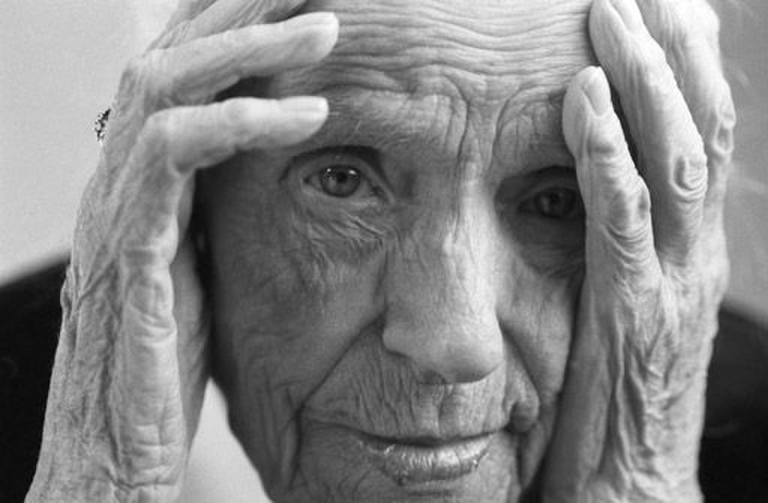
Old age
Good feeding habit promotes longevity but still doesn't mean that we will live for ever. On the other hand, bad feeding habit shortens the life spans. All cells are programmed to die at a particular point in time and this mostly common in animals, mammals and other higher creatures like humans. In contrast to this, smaller creatures can be potentially immortal by producing replicate identical cells of themselves. Through this, they remain viable and alive for a years.
In a nutshell, we age as a result of accumulation of accumulation of changes in the form of damages over time. It is chronic process that actually begins the moment we are born and it continues until at a point where the cells come to a stand a still. I.e the cells loosing their regenerative ability thereby leading to a decline and loss of immuno protective functions. Commonly, the from what we eat, radicals such as reactive oxygen/nitrogen species are derived. These radicals cause oxidative damages to cellular activities of cells and at the long run, impair their biological and physiological functions.
Cells are the building block of all components of the humans body. As cells unite to form tissues, so do tissues unite to form organs. Multiple organs in turn makes up the complex body system. When the foundation of anything is weak or faulty, the whole structure comes crumbling down. This is just a simple example of how the human Body system is built. I will limit this discussion to cel death as a consequence of induced oxidative damages coming from radicals. This type is commonly referred to as cell death due to oxidative stress factors.
The visible and obvious effects of aging most times comes with diseases that ultimately lead to the death. When the liver for example is unable to carryout one of its most important role - detoxification of toxic metabolites of metabolism, these substances accumulate in the body and cause harm to other organs. The constellation effects leads to multiple organ failure that ranges from the kidney, pancreas, spleen, lungs and more. In this case, we could say that the aetiology of the disease is pathological.
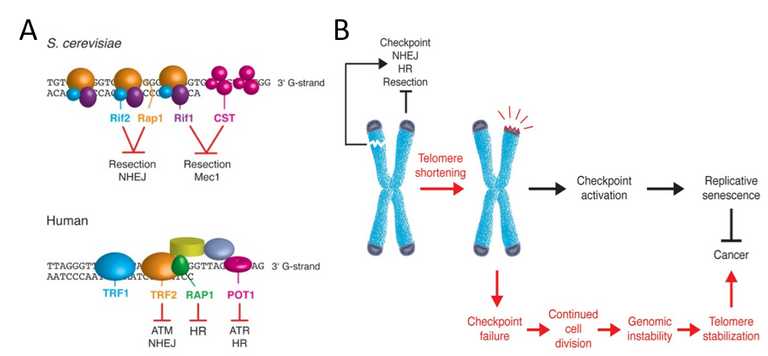
Overview of the role of shelterin-telomere complexes
Cells are programmed to die at some certain point in time, and when this occurs, it is referred to as physiologic cell death. Besides physiologic cell death which is referred to as apoptosis, they also exhibit what is known as senescence. The ends of eukaryotic chromosome contain a repetitive sequence of gene code - GGGTTA that are constantly replicated per cell cycle. This sequence of DNA code is called telomere and they mainly serve to protect the ends of the chromosomes so that they do not get tangled. You might want to ask, what do they have to do with aging.
Telomere are replicated by the enzyme known as the telomerase after every cell division. However, per mitotic cell division, the telomere is gradually lost and shortened. As this continues, it gets up to a point where they are now too short for replication and as a result of this, it signals the cells that they are getting old and hence time for them to retire. At this point, the cells stop dividing and subsequently goes into a state of inactivity known as senescence. Once senescence is reached, the cells either remains inactivates and stops dividing or undergo programmed cell death.
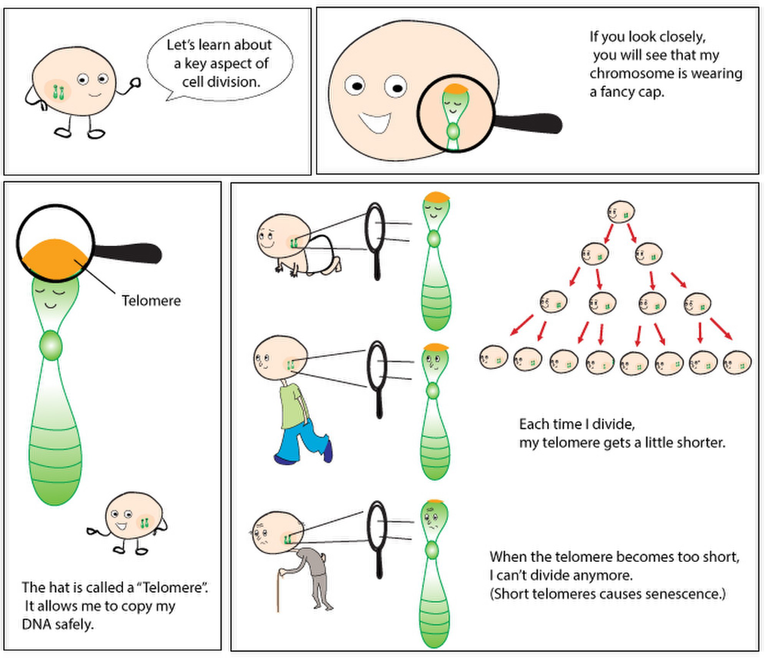
The end replication problem causes telomeres to shorten over successive cell divisions
However, not all cells go into a senescence stage. Some type of stem cells, and to be specific, the embryonic stem cells do not go into senescence. Embryonic stem cells are totipotent in nature (cells that can form all types of tissues in the body) hence, they are immortal. This particular feature of immortality is necessary for procreation and life continuity.
Because of this immortality, they embryonic stem cells do not loose their telomerase function unlike as seen in somatic cells. This feature is also seen in cancer cells. When somatic cells bypass senescence, and are unable to stop dividing as at when due, the resulting effect is cancer. Cancerous cells do not respond to cellular signals in cell division which control physiological processes.
For this main reason, cancer cells continue to divide infinitely while at the same time competing for nutrients with normal healthy cells. So, senescence in somatic cells and stems with the exception of embryonic stem cells is a very control system to limit cells that are aged. Summarily, we age due to decline in cell functions caused to either diseases or physiological processes that see preprogrammed already in the cell.
Our life style e.g. smoking, consumption of foods with high radicals can trigger an increase in oxidants that damage healthy cells. Now what if we can reverse this aging in humans, and if we can, is it of benefit to us or not? I will allow you ponder while I explain age reversal.
Age reversal, really worth it?
Reversing age is just like turning back the hands of time, and this begs the question, why should we do it. Well If you take s deep look at the idea of age reversal, to some extent, it has it merit, however still has demerits. The main consideration here would now be, does the benefits outweigh the risk or negative sides of it? Imagine a would full of immortal beings, you grow but you never die. I only wonder how such a world would look like. Just as we have earlier elucidated, some cells need to continuously replicate indefinitely while some need to replicate and at some point stop.
The continuous replication which is typical of healthy embryonic stem cells ensures propagation while somatic cells (non gamete cells that form the body of organisms) which of course are differentiated (have specific functions) cannot replicate indefinitely. Somatic cells which form cells of the tissues like the skin, muscles etc. are well differentiated and have specific functions. Research has shown the possibility of reprogramming a somatic cell and converting it from being a differentiated to an undifferentiated cells like the stem cells. Now this is where the concept of cells reprogramming takes its pride.
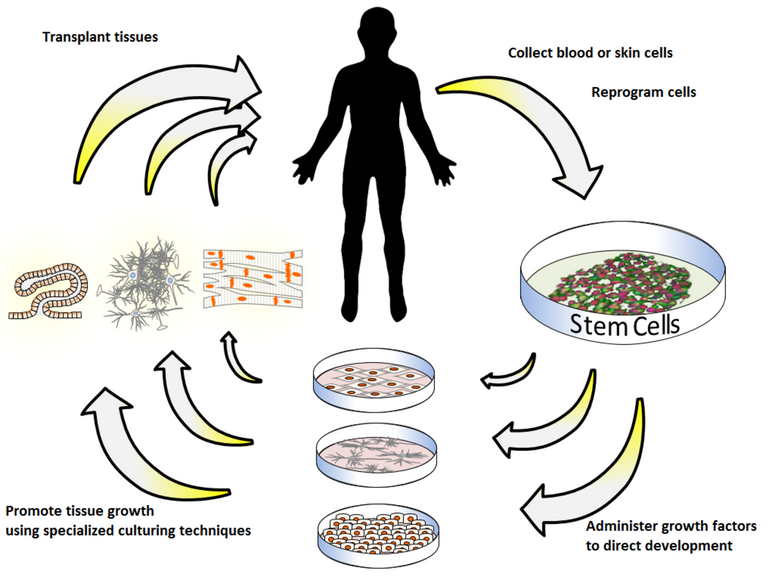
An overview of general techniques in regenerative medicine
I will not go into the intricacies of hoe this is done, I will talk about it in details in another separate post. I just want to introduce you to the possibility that lies in cell reprogramming and possible merits and demerits this procedure could have both on the economy and on we humans in general. In a broad sense of it, cell reprogramming means the engineering or reprogramming of a cell and changing it from its natural form to another form. When we for example convert a cell that is not designed by nature to divide indefinitely like a stem cell and make it do so, this is is simply referred to as pluripotency induction.
Cell reprogramming actually falls under Cell engineering as a branch of biotechnology. The prospect that this field holds so far is incredible because it is now very clear that we can reverse and recreate a lot of tissues or aging or diseased cells. Those things that were thought impossible are now the possible. Through cell reprogramming, we can now comfortably produce a lot of vital tissues, e.g. the laboratory production of blood for use in patients with rare incompatibly disorders. I will discuss this also in details later in separate article.
When cells are reprogrammed i.e. the conversion of adult skin cells (somatic cell) into induced pluripotent stem cells (iPSCs), which have the ability to differentiate into many different types of cells, they take on the characteristics of natural stem cells. The concept has so far helped us understand the real basis of aging, besides other theories that have been proposed to be causes of cell aging. One of the major benefits this concept has provided us as humans, is the new source of using cells for cell-based therapies. In a broader sense of it, it tends to provide us new insights in the field of rejuvenation and regenerative medicine.
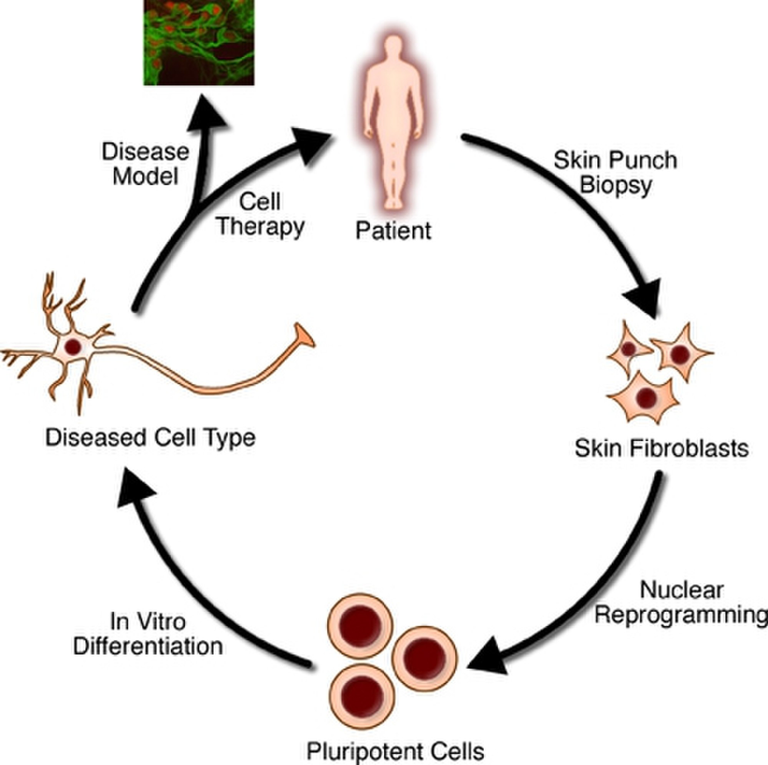
The production of cellular therapies requires the optimization of four steps: first, isolating and culturing cells that can be readily obtained from a patient in a non-invasive fashion. Second, the reprogramming of these cells into a pluripotent state. Third, the directed differentiation of those patient-specific pluripotent cells into the cell type relevant to their disease. And, fourth, techniques for repairing any intrinsic disease-causing genetic defects and transplantation of the repaired, differentiated cells into the patient. Notably, these disease-relevant patient cells can also be used for in vitro disease modeling which may yield new insights into disease mechanisms and drug discovery
When the main aim of age reversal is mainly channeled to healing, tissue repair, treatment of life threatening diseases like cancers, then I sure would not have any problem welcoming the idea. But when it directed to reversing natural aging cells or more like for example, reversing age in humans, then I would not welcome the idea. I mean, who actually wants to live forever in life, I don't think anyone does. We all as humans have natural saturation point. No matter how interesting life might be, one day will come and we will all wish to rest. This is inherent in us as humans.
The research work done and published by David Sinclair and his research team showed the possibility of age reversal, though this was done in rats and not in humans. From their research findings, they concluded that epigenetic changes (changes that occurs in DNA but do not alter the gene code, e.g. DNA methylation, Histone Modifications etc.) are the driving factors for aging in cells.
So if they can reverse these changes by rebooting the cells, then factors that drive aging process will be suppressed and as a result reversed. If this is replicated in humans and possibly successful, then indeed, we could all have a brighter hope for tomorrow as regards to treatment of chronic diseases of the brain, heart etc. However, I still have my doubts on the feasibility of this in humans and the possible consequences this would have should it be extended to actual age reversal in humans and not just treatment of chronic diseases. This is more like playing god. I don't want to live forever on this planet earth, and never will I wish for it.
If all the ancestors that have lived before us were still alive, how would the world look like? One thing is sure to happen - over population and increased human pressure on the environment and the ecosystem system at large. The pursuit will be worth it, if it is mainly channeled to finding the permanent cure to neurodegenerative diseases which usually are known to have no cure. If the brain cells, hearts cells for example can be reprogrammed and induced to regenerate new neurons and cardiomyocytes respectively, then, our older ones who are prone to this old age disease can comfortably live their life until the right time for them to pass on is reached.
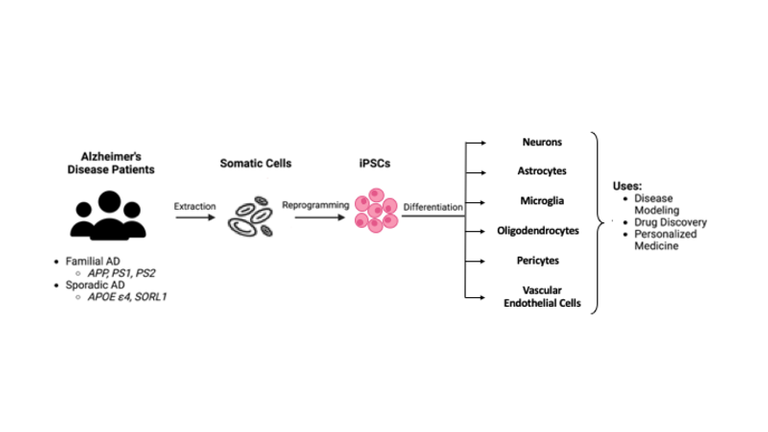
iPSC Methods used to study Alzheimer's disease
I think more focus should be on the regenerative potential of the approach and not channeling resources to actual age reversal in humans. It is not worth it in this regard. Regenerative medicine is indeed a beautiful area worth exploring because the prospect it has is limitless, however, I do not buy the idea of playing god by actually making attempts to actually reverse human age. This to me does not look ethical and for sure would have measurable consequences. Cloning of humans was resisted, this will likely not be an exception. Its application on treatment of chronic diseases, yes! Reversing our age, No!
Teach more ways to live right, that I may increase my life span and die a natural death at the appointed time. Death is inevitable in all humans, no matter how try to stop it. The best we can do for ourselves stay healthy by maintaining healthy life style and eating healthy foods.
Alright, that will be all for today, hopefully when I have time, I will discus with you in practical ways how this pluripotency induction is carried out. See ya!
References
•Scientists Have Reached a Key Milestone in Learning How to Reverse Aging
•Loss of epigenetic information as a cause of mammalian aging
•Scientists' enthusiasm grows for induced pluripotent cells
•Human age reversal: Fact or fiction?
•Cellular reprogramming and epigenetic rejuvenation
•Epigenetic reprogramming of cell identity: lessons from development for regenerative medicine
Congratulations!
✅ Good job. Your post has been appreciated and has received support from CHESS BROTHERS ♔ 💪
♟ We invite you to use our hashtag #chessbrothers and learn more about us.
♟♟ You can also reach us on our Discord server and promote your posts there.
♟♟♟ Consider joining our curation trail so we work as a team and you get rewards automatically.
♞♟ Check out our @chessbrotherspro account to learn about the curation process carried out daily by our team.
🏅 If you want to earn profits with your HP delegation and support our project, we invite you to join the Master Investor plan. Here you can learn how to do it.
Kindly
The CHESS BROTHERS team
Thanks for your contribution to the STEMsocial community. Feel free to join us on discord to get to know the rest of us!
Please consider delegating to the @stemsocial account (85% of the curation rewards are returned).
Thanks for including @stemsocial as a beneficiary, which gives you stronger support.
We have been playing Gods since age immemorial, I don't see why aging should be an exception!
I actually think it's inevitable. We can't go on learning stuff, then dying, then having to re-teach same stuff to younger versions of us, but this time a smaller chunk of it cos knowledge is greater, leading to ever-increasing specialization which leads to less wisdom and makes us more like work-robots. Eventually we will reach the limit or how little a single human can learn + our brains having the same capacity as always + society as a whole functioning even though every single human knows so little. How will we be able to function politically, when every single human will know so little about politics that basically they will know nothing? We now have historians specializing in a single year!! What will it be in the future? Historians who specialize in a single day? In a single hour? How long until we can't take this much specialization, and knowledge stops increasing, and we find ourselves in some Groundhog Day scenario?
Defeating aging is also the best way to defeat most chronic diseases. Most young people don't die of cancer, after all! Nor do they get Alzheimer's. Nor do they usually die of our number one killer, heart disease. Instead of trying to treat or postpone all these diseases, or curing them to have them replaced by others, it's better to cut the rotten tree at its root: cure aging and you've cured 99% of diseases.
I don't see why defeating aging is seen as unnatural. I look around right now, as I'm writing to you, and I struggle to find anything that is natural. Is this computer natural? Are the clothes I'm wearing natural or synthetic? My phone? The house? The electricity? The veggies on my plate? Did these veggies exist in this form 10,000 years ago or did we make them to suit our palate?
We have been fighting Nature forever. That's what all animals do. That's how you know something is alive! Beavers build dams, ants build nests... We defeat aging. And, like you said, there are immortal organisms.
Even from a theological perspective, there's persons in the Bible who lived for, like, 500 years or something. So until we reach that age, I don't think there's any reason for the priests to be alarmed :P
whoops, you do have a very strong case here, however, truth be told. Nature has a way of revenging. The consequences sure abound, and this is something inevitable. The cases of cancer and chronic diseases have been on the rise than ever before, possibly as a result of increased interaction with products of unnatural source (just a perspective).
No doubt, virtually everything around us are almost not natural.
Knowledge is passed on from one generation to the other and most times written down for the next generation to develop on. A man with an idea of solving a particular problem might need someone smarter than him to complete the job. This is where human genetics comes into play as well. People are born with different IQ.
To me, defeating aging is like a mirage, though the possibilities are there, however, it will come with a great price and definitely with an unknown consequences. Probably not in my time. haha. You could imagine if we had clones humans working around us. Everything has a price.
the likes of Methuselah, lol.
I think age is the disease. There is this cool Ted talk about this discussion. Aubrey de grey.
In agreement with this 100 percent. There has been a lot of theories behind aging, ranging from hereditary down to the molecular level. The molecular level seems more revealing than other theories.
I just wish all cells can be like the embryonic stem cells 😂😂😂 funny right.
Living a healthy life all boils down to our lifestyle which includes feeding very well and also exercise. Good food leads to good health while bad one leads to ill health.
It would be greedy to say we should accept age reversal as it would lead to over population on earth. I would love the reversal of diseases yet an individual will still die at due time.
People are suffering from disease everyday in the hospital so this reversal will reduce suffering on earth. Thanks for sharing your knowledge with us I do appreciate.
lol, nature has made them that way so that we do not go into extinction. Imagine if they loose their tortipotency, the rest of the story I beleive you know.
😂😂😂 please oo. They should not lose it ooo. The world would not be a better place to live at all
What a thoughtful essay, beyond science, although rich with science.
I feel like an expert on this subject. My 76th birthday is this month. I lost two siblings already and another is now suffering from cognitive decline. He is 80. A fourth sibling will be 79 next month, is diabetic and experiencing issues with mobility. The remaining sibling is a year older than I am, hearty and hale. So this is the basis of my expertise.
I think, if regeneration meant better health while we were alive, that would be a good thing. Extending useful life would be a good thing. But at some point, we really should, as you say, "rest". There is a matter of resources.
I've had a generous portion of life, more than many. It seems my family still needs me, but I never want it to be the case that I need them. When that happens, I think I will have lived too long.
This is a personal response to your thoughtful, objective, scientific article. I get busy and forget to read your blog, but am richly rewarded when I do.
Take care, @cyprianj
Such a heart warming comment from my favourite mum on hive here😍.
I am happy our thoughts align. Thanks so much, and on a personal note, we still need you here with us, so I am adding more fruitful years in good health by faith.😅
wishing you from my heart, a Stupendous and fun filled celebration of life in advance, hopefully we will celebrate you here as well. I will be watching out for the celebration on your blog🤗
Cheers to more life in good health.✨✨✨
🌈🌸
Thank you. I love Hive, StemSocial, and the people I 'meet' here. Truly a gift for me.
Again, your blogs are always wonderful.